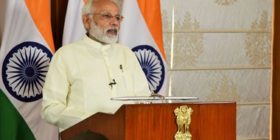Narendra Modi is clearly not the man when he speaks to Indian audiences and when he speaks to foreign ones in English. His BRICS summit speech simply failed to impress due to a flawed body language.
It was somewhat disconcerting to watch Prime Minister Narendra Modi’s lacklustre performance in the first speech he gave to an international audience during the recent BRICS summit. While one can understand his nervousness on the occasion, but his apparent discomfort and lack of preparedness in making a speech in English showed that he was not the confident politician we saw during the election campaign. It was not the content of this speech, but his non-verbal behaviours that amounted to give his audience an exit ticket. Here are some of the more glaring ones.
Lack of eye contact: It is a must for any speaker to look into the audience’s eyes to connect with them. Normal eye contact would include looking at any one person in the audience for at least two or three seconds before moving on to another person. A good speaker normally looks around the seated audience, halting every few seconds to make eye contact with any one specific person, and then again moves his eyes around. Modi was so busy reading from his written speech that he barely glanced up for a few milliseconds, spending no time on eye contact whatsoever. This behaviour can get irritating and disengaging for the audience, for they could conclude that the speaker is not actually talking to them. If you must look at your notes, pause, refer to them, look up again and then continue.
Shifting feet: Throughout his speech, Modi shifted from one foot to the other, swinging like a pendulum, making it difficult to watch him with a steady gaze. This behaviour suggests his nervousness and perhaps a desire to be elsewhere. A good strategy for avoiding this shifty tendency is to stand with feet slightly apart. Better still would be to shift your position or stepping slightly forward and backward, after every point is completed.
Self touching gestures: Any self touching gestures, like clutching your arms, or touching your face, signify nervousness and apprehension. As Desmond Morris puts it in People Watching, “Self -intimacies are movements that provide comfort because they are unconsciously mimed acts of being touched by someone else.” They are a pseudo replacement for the need to be comforted. In some pictures, Modi can be seen massaging the fingers of one hand with the other, barely one minute into the speech.
Clutching the podium: Clutching the two ends of the podium is an easy way to release tension. But this locks the hands which can otherwise be used to highlight the points that one makes. Anyone who has watched Modi in other speeches back home would know that he is a master at using his hands for effective emphasis and illustration. The larger the audience, the more emphatic would be his hand movements to ensure that the people sitting on the last seats don’t miss his energy. One is only left guessing as to what happened to those hand movements during this particular speech in Brasilia.
Lack of correct expressions: If you turn off the volume, you cannot make out whether Modi is reading out a grocery list or proposing solutions that can take the BRICS nations forward to build a better tomorrow. A good speaker shows the ebbs and tides of emotional variations as his speech proceeds. Forget to show the expected level of enthusiasm and accompanying expressions and you will invite enable the audience to switch off their auditory receptors.
When the camera at the BRICS summit moved around the audience, you could see that the audience was not very impressed. At best, there were a few polite smiles being handed out to Modi. In circumstances like these, serious proposals, like the ones Modi was making, can be lost. It is therefore imperative for any good speaker to be aware of his non-verbal behaviour when he is on the stage. While it would certainly be challenging to focus on your behaviour as well as the content of your speech simultaneously, some practice beforehand can make the difference.
The BRICS summit clearly shows that Modi needs to do some homework on his speeches when he is on foreign soil and speaks English. His normal energy, which makes his Indian audiences hang on to his every word, was missing in Brasilia.
The author is a body language consultant.






Leave a reply